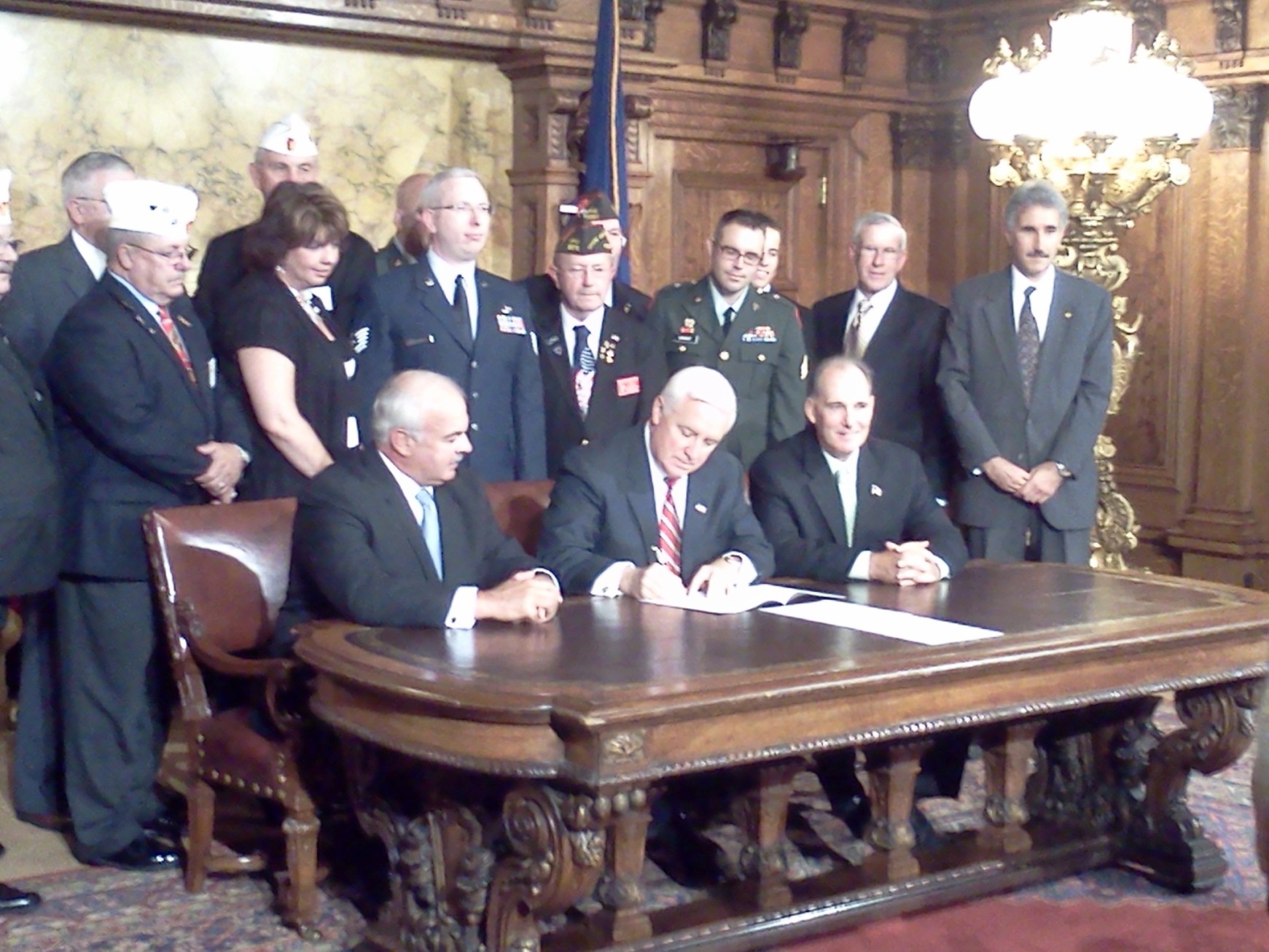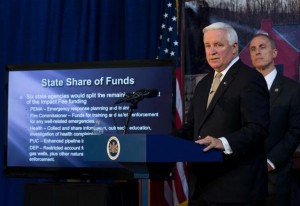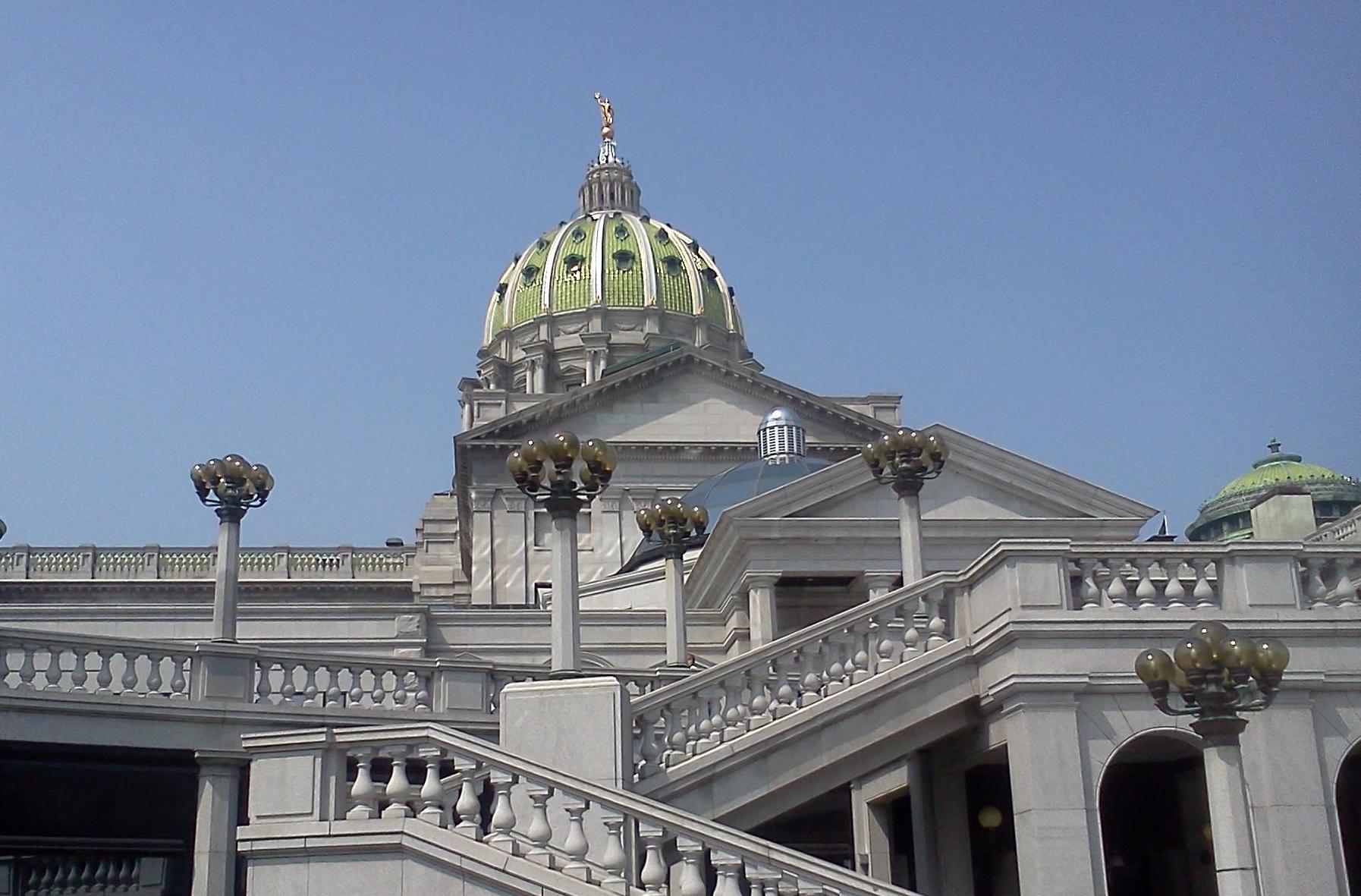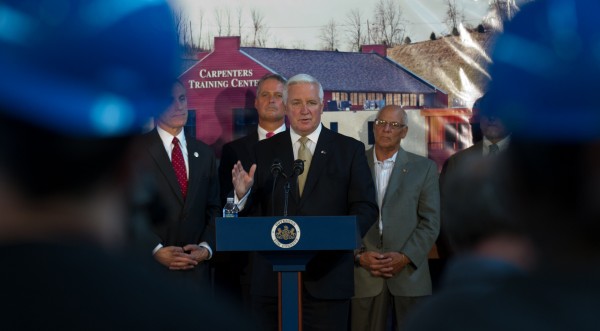Posts
Top Lawmaker Wants to Address Transportation Funding Now
/in News /by PAMattersMake room in the already crowded fall agenda. In addition to Marcellus Shale, education reform, redistricting and privatization – transportation funding is the latest high profile issue to be added to the front burner. State Senate Appropriations Chair Jake Corman (R-Centre) tells reporters that he’ll soon introduce legislation that mirrors the recommendations of the governor’s Transportation Funding Advisory Commission.
Pennsylvania faces a roughly $3.5-billion annual transportation funding gap, and the commission’s recommendations would raise $2.5-billion by year five. “We’re going to do this someday and it’s not going to get cheaper,” Sen. Corman says. “The only reason not to do it is political fear, and that’s just not acceptable.”
The Transportation Funding Advisory Commission would raise the money for roads and bridges by uncapping the Oil Company Franchise Tax, indexing vehicle and driver fees to inflation and increasing fines and fees for traffic violations. The average driver could pay up to $36 more in year one, and $132 more by year five. However, those amounts could be lower depending on how much of the oil franchise tax is passed onto consumers.
But Corman says inaction is not saving Pennsylvanians any money. “We’re going to pay it in extra gasoline in traffic; we’re going to pay it in extra wear and tear on our vehicles. You know it’s an average 10-mile detour when a bridge is closed down,” Corman explained to reporters after session on Wednesday.
Corman says the time to act is now, but acknowledges that it will require direction from the governor, as the Transportation Committee chairmen have indicated no interest in moving this legislation without hearing from Gov. Tom Corbett.
To this point, Corbett hasn’t made any decisions about how to approach transportation funding. Speaking at a news conference earlier this month, Corbett said, “They’re all priorities that we need to take a look at, but not everything can go first.” The governor was responding to a question about where transportation funding fits into the fall legislative agenda.
Corbett Unveils School Reform Agenda
/in News /by PAMattersThe new education paradigm that Governor Tom Corbett envisions would put students first. While visiting the Lincoln Charter School in York, Corbett put forth a four point plan that he wants to see implemented in time for the 2012-2013 school year.
It starts with a revamped charter school law in Pennsylvania. “My plan calls for a state commission to approve and to oversee the charter schools of Pennsylvania,” Corbett says, adding that the commission of experts would also have the power to pull the plug on charter schools that aren’t meeting educational standards.
Controversial school vouchers also make an appearance, but they would only apply to low-income students in the lowest performing 5% of PA’s schools. “Students whose families earn 130% or less of the federal poverty rate would be eligible for these scholarships,” Corbett says. “To give that to you in dollars and cents, that’s a family of four earning $29,000.” Students who come from families earning slightly more would be eligible for a portion of the so-called opportunity scholarships.
The new teacher evaluation program that Corbett envisions would include student performance. “Right now the evaluation system is merely a rubber stamp, and it must change if our students are going to be the beneficiaries of good, committed educators,” Corbett says. The current system allows only for a satisfactory or unsatisfactory rating. The new system that’s currently being piloted would allow for ratings that range from distinguished and proficient, to needs improvement and failing.
The state House has already passed a bill that encompasses Corbett’s fourth goal of expanding the Educational improvement Tax Credit (EITC), which is awarded to businesses that fund scholarships and other educational improvements.
Corbett concluded that he’s not happy with the status quo. “When we have failing schools, we have failing students,” he says, pointing to the School District of Philadelphia’s 45% drop out rate. Reaction to the Corbett agenda is rapidly pouring in; check back later for a recap.
New Law Puts Veteran on Civil Service Commission
/in News /by PAMattersThe latest law signed by Governor Tom Corbett requires that at least one member of the Civil Service Commission be a veteran of the United States Armed Forces. “This legislation will say that Pennsylvania’s veterans will finally have what they deserve, a constant representation on the state’s Civil Service Commission,” says State Rep. Ron Marsico (R-Dauphin), the bill’s prime sponsor.
“We discovered that the Pennsylvania Civil Service Commission has not always met its goal of seeing that the veterans get the extra consideration that they earned,” Governor Corbett said as he thanked Auditor General Jack Wagner for calling attention to the problem.
It was a 2008 audit that first found that state agencies skirted veterans’ preference requirements and failed to consider eligible veterans for 569 vacant positions. The state’s Veterans’ Preference Program provides that veterans who pass the civil service exam receive 10 additional points, and have mandatory hiring preference if they have one of the top three scores for the position being considered.
Auditor General Jack Wagner says the new law is especially important during a time when the unemployment rate among returning Iraq and Afghanistan veterans is now 10.9% in Pennsylvania. That’s much higher than the statewide unemployment rate of 8.2%. “A veteran on the commission will ensure that the civil service system works properly for all of Pennsylvania’s veterans,” Wagner said in a written statement.
Just before signing the new law, Governor Corbett announced that he’s nominated John Stevens to the commission. “He is a man who knows both the purpose of civil service and the needs of our veterans,” Corbett says. Stevens, a Centre County resident, is a veteran of both the Pennsylvania National Guard and US Army. His nomination is subject to Senate confirmation.
Some Question the Structure of Gov’s Impact Fee
/in News /by PAMattersThe Marcellus Shale plan that Governor Tom Corbett rolled out provides for an “impact fee” to be adopted by the counties where the natural gas drilling takes place. In the first year, counties could impose a per-well fee of up to $40,000 dollars. The maximum fee would drop over the next several years, but Corbett says the revenue would actually grow along with the number of wells.
The County Commissioners Association of Pennsylvania (CCAP) supports the direction of Corbett’s Marcellus Shale plan. “Our only issue with the proposals is a significant concern that we have with the plan that the local impact fee would be levied separately by the counties,” CCAP executive director Doug Hill said in an interview with Radio PA. “It needs to be uniform, it needs to be consistent, it needs to be predictable, and that does not happen if it is county-by-county, with the potential for varying rates within the counties.”
Some lawmakers agree. “This proposal only authorizes counties to impose a fee, it doesn’t require them to impose a fee,” says State Senator John Yudichak (D-Luzerne), the minority chair of the Environmental Resources and Energy Committee. In a statement, State Rep. Mike Sturla (D-Lancaster) called the plan complicated and ill-conceived.
But Governor Corbett calls the structure of his proposed “impact fee” important to the package. “If you bring the money here to Harrisburg first, history demonstrates to us that administrations and legislatures – the money goes into the General Fund – start raiding the General Fund for other budgets,” Corbett explained to reporters on Wednesday. “I believe the money needs to go where the impact is.”
Under the Corbett plan, 75% of the impact fee would be retained at the local level. The remaining 25% would be divvied up among PennDOT, the Department of Environmental Protection, PEMA and more.
Q1 State Revenues Miss the Mark
/in News /by PAMattersThe first quarter of the state’s fiscal year is in the books, and the numbers tell the tale of a flagging economy. “All the major tax categories were below estimate for the month, so clearly the economic conditions are having an impact on tax collections,” says state Revenue Department spokeswoman Elizabeth Brassell, while discussing the latest revenue report.
September’s General Fund collections were $151.8-million (6.1%) below estimate, which means state revenues are now $215-million (3.5%) below projection for the fiscal year-to-date. Sales taxes have come in 1.4% below estimate, personal income taxes are 4% off the mark, and corporation taxes are nearly 13% less than anticipated so far this fiscal year.
Governor Tom Corbett says he’s watching the situation closely and is paying particular attention to the month of October. “We kept aside $700-million. Our goal was to go into next year with $500-million on hand, you’d kind of like to have money on hand going into it,” Corbett said during a question and answer session with the media on Wednesday.
The $700-million that Corbett refers to was the unallocated revenues remaining at the end of FY2011. Corbett continues to stress that was not a surplus. “If the revenue decline isn’t indicative of that, I don’t know what else is.”
Governor Corbett Announces Marcellus Shale Proposal
/in News /by PAMattersGovernor Corbett has released his plan for the Marcellus Shale industry, calling for some stronger regulations, an impact fee and the development of green corridors for natural gas vehicles. He made the announcement after weeks of reviewing the recommendations of his Marcellus Shale Advisory Commission.
The Governor’s proposed impact fee on Marcellus Shale wells would be adopted by counties. He says 75% would be shared among each county and its municipalities. Twenty-five percent would go to the state, with the largest share to PennDOT and the rest split among the Department of Environmental Protection, Pennsylvania Emergency Management Agency, the Pennsylvania Public Utility Commission, and the State Fire Commissioner.
The Governor is also calling for enhanced environmental standards for drilling operations, and higher penalties for violations. He wants to increase the gas well setback distance from water wells and public water supplies. He would also increase the well setback distance from streams, rivers, ponds and other bodies of water. He wants to increase the well bonding fee.
The Governor’s plan would allow DEP to take quicker action to revoke or withhold permits for operators who consistently violate the rules.
The impact fee would be up to $40,000 per well in the first year, $30,000 in the second, $20,000 in the third and no more than $10,000 in years four through ten. He says that’s a total of $160,000 per well. Governor Corbett says estimates show that the fee would bring in about $120 million dollars in the first year and $200 million within six years.
Of the 75% that would stay at the county collecting the fee, Governor Corbett says 36% would be retained by the county, 37% would be distributed to municipalities that host the drilling pads and the remaining 27% would be distributed to all municipalities in a county that is impacted by Marcellus using a formula based on population and highway miles.
Governor Corbett says the money could be used for things such as road maintenance and repair, water and sewer system construction and repair, projects to increase affordable housing for low income residents, social services and municipal planning.
The Governor says he will seek to develop green corridors in the state for natural gas vehicles. He says we have all this gas; we need to have a market for it.
Governor Corbett says the energy under our feet is going to be fueling the state’s economy, heating the homes, lighting houses and businesses for generations to come. He says it’s cleaner and it creates much fewer emissions. He says energy means jobs. The Governor made his announcement at a carpenters’ training facility in Pittsburgh Monday morning.
GOP, Women Boost Corbett’s Poll Numbers
/in News /by PAMattersGovernor Tom Corbett’s approval ratings have reached the elusive 50% mark, according to today’s Quinnipiac Poll. “Governor Corbett’s batting average with Republicans and women in the state have surged 11 percentage points,” says Quinnipiac pollster Tim Malloy, who notes that today’s 50 – 32 mark is Corbett’s best to date.
“Compared to slumping GOP governors in other swing states, he’s headed to the all-star game,” Malloy says. “The governor’s having a good month. People are gravitating toward him.” In Ohio, a recent Quinnipiac Poll shows Governor John Kasich under water with a negative 40 – 49 job approval rating. In Florida, 50% of voters disapprove of the job that Governor Rick Scott is doing.
“Whatever’s happened in the past few weeks… it may be the flooding, the way he handled that, it may be that people are just warming up to him. He’s had a good week here,” Malloy said of Corbett’s surge. However, Corbett’s support wanes when voters are asked they like his policies. 42% said they “like” Corbett’s policies, 37% responded “don’t like.”
Governor Tom Corbett on the 9-11 anniversary and memorial events in Somerset County
/in Ask the Governor, Media, News, Video /by PAMattersGovernor Tom Corbett on dealing with disasters
/in Ask the Governor, Media, News, Video /by PAMattersWelcome to PAMatters.com, a new source for news and commentary from Pennsylvania’s capital. In addition to video, audio and pictures from the stories and events that affect YOU, you’ll also get some behind-the-scenes analysis via blogs from our award-winning staff of journalists.












